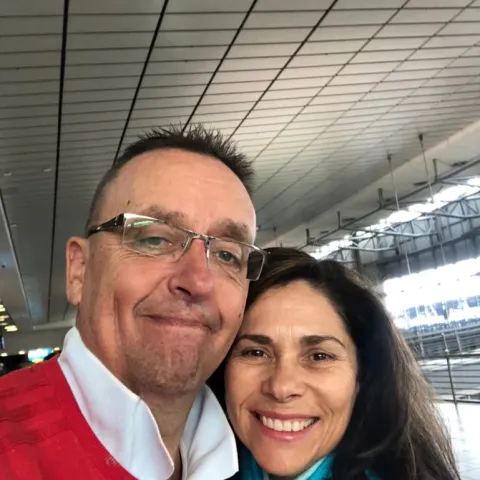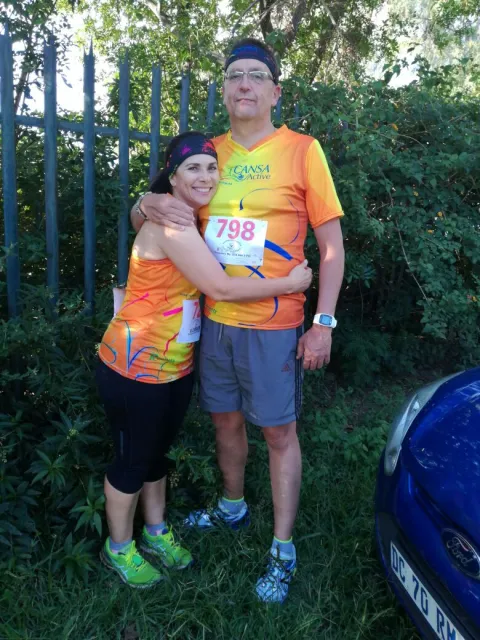
Lucy, South Africa

When Cancer Becomes Your Life’s Work
I am no stranger to cancer; it’s the disease that guided me towards a 20-year career at the Cancer Association of South Africa (CANSA). What I didn’t expect when I started with CANSA as a Corporate Fundraiser in 2005, is that cancer would once again become personal for me, reaching far beyond my nine-to-five.
As the now Head of Marketing and Communication at CANSA, my days are often filled with meeting cancer survivors and sharing their stories. This is where I feel grounded, reminded of my purpose, and the important role the non-profit organisation plays in fighting cancer.
My Story
Before I joined CANSA, my mother had passed away from liver cancer. She was an incredible woman who was told she had only 6 to 8 months to live and survived another 10 years! I always wished I had known more about cancer and how to be a caregiver, as I could have been a much better caregiver to her when she was still alive.
My aunt passed away from cancer, and in 2006, one of my best friends, Joan, passed away from breast cancer - which was devastating. I remember how a fundraiser for CANSA, Shavathon was special that year as so many friends were shaving or spraying in her memory. In 2016, my dad (76 years old at the time) was diagnosed with prostate cancer. It was in the early stages, so he is not currently receiving treatment but is being closely monitored. Then, in August 2016, the sudden news came that my partner, Wayne, was diagnosed with prostate cancer. The year before, in 2015, his sister, whom he was quite close to, had passed away from brain cancer. From the time of diagnosis to her passing away, it was just over a month and a half. He missed her terribly as she was a confidant and his ‘go-to person’. Wayne was 49 years young, and the treatment protocol involved for him specifically was three-phase – brachytherapy (placing radiation directly into the prostate), hormone injections to reduce the levels of testosterone, as well as radiation.
Even though I had always been touched by cancer indirectly, this was now extremely personal. Working at CANSA as an official spokesperson means I am often speaking at events, on radio or television, or being interviewed on cancer - the disease as well as CANSA. I always believed my personal experiences with the disease bode well for me in my career – but now this all seemed so incredibly surreal. Is this really happening? He had been for a medical, and his PSA levels were high, so he did another PSA test that still showed high levels. Finally, he did a biopsy that confirmed the diagnosis. I was now a caregiver and support mechanism for my loved one. I’ve always believed that a cancer diagnosis can be so tough on family, loved ones, and friends of the cancer patient. Some days I feel that I don’t know enough about cancer and how to help, and I’ve been doing this professionally for a very long time. Cancer can make you feel lost.
I drew on my knowledge from my work with CANSA. What every cancer patient needs are support and often just being there next to them. Attending doctors’ appointments with them and listening to the outcomes and planned treatment is one way people can support those that are undergoing treatment. There are good days and other days that are not so good, but we get through it. The first time he went for radiation, I went with him to the Clinic – we were so impressed by the supportive and welcoming nature of the staff and radiologists. Other patients in treatment were popping in just to say hello while we were there. It felt like this was a new place helping us with our cancer journey. They explained what to expect during his treatment plan – for the first time, I wasn’t being the pillar of support, but the supported. They showed me when Wayne was in the radiation machine, and at that time, I remember just wanting to burst into tears. It became incredibly real to us that he was diagnosed with cancer. He said that he felt the same way when he was on the machine. However, I remain hopeful and very optimistic as he is officially in remission and is positive and strong. His PSA count has come right down following all treatment, and that is so relieving. Now it’s a case of regular monitoring and screening. Wayne shares his story often and encourages all the men around him to go for regular screening resulting in two of his friends being diagnosed recently and lives were saved.
He also conveyed to me how fortunate we are in that we can afford to have medical aid and that there were so many others living with cancer who do not have access to private care. Having said that, I also realised that CANSA staff and volunteers are called upon often by patients who have medical aid and are just overwhelmed and need some guidance and counselling when diagnosed. In our fortunate situation, I kept thinking of our CANSA Care Homes and how that helps patients while they are getting treatment at a public facility. Without these Homes, many of the patients would have no one to help them.
The things I wish I could teach everyone about cancer
We all can lower or reduce the cancer risk. My mom used to always say, ‘health, happiness, and then money’. In our everyday lives, we can take action that can only benefit us from a health point of view – exercise each day, take a walk for 30 minutes, or do stretching exercises if you can’t afford to go to a gym. Eat smart and choose healthy options - more veggies and fruits and less processed foods and junk food. Don’t smoke and be SunSmart by looking after your skin and applying regular approved sunscreen when active outdoors. Go for regular screening – so many people are diagnosed early because they did regular health checks, just like my dad, and so this means more successful and better treatment options.
So many people are so scared of being diagnosed and of the outcome – I advocate that I would rather know because that means I can act to help me live longer, see to it that my loved ones and family are taken care of, and that I can spread the message that you are not alone. The longer you leave it, the fewer options available and less chance of recovery. Cancer can have a devastating impact on the individual and people around them, so an extremely important thing to consider, especially for younger people who think they are invincible and going to ‘live’ forever, is to ensure that you have some form of medical aid. Start with at least a hospital plan, and when you can afford it, get a medical aid in place. It’s also important to ensure you have a will and life insurance in place. I have friends and colleagues who never got this in place and end up with major financial stress and challenges.
Coping mechanisms in place to deal loved ones being affected by cancer?
I talk about it often to help spread the word that each of us should be aware of being healthy. As an extrovert, I tend to share and talk more, so I have realised that others are introverts or won’t be as forthcoming. I also have tremendous support and advice that I receive from work colleagues who are in very similar situations. And I have a bunch of friends – we call ourselves the ‘Twisted Sistas’ – they can listen to me rant and rave or just hear my fears and thoughts. When I feel panicky, they help me to get perspective. I run and also volunteer at parkruns and my running club regularly, and this keeps my immune system strong. I believe I should be healthy as Wayne might need me anytime. My dad has taught me so much about being a caregiver – he was the main caregiver with my mother, and what an incredible patient and loving man he is. This helped her to live longer.
Sometimes it’s hard to deal with it and wonder why a specific person got cancer – when it happens, it’s how we deal with it that matters most to me. You can choose to try and manage as best as you can and don’t be scared to look to others for support. I get so amazed and in awe of cancer patients and survivors – they’re often humans going through a vast array of emotions and trying to ‘process’ what’s happening to them. They carry on with their lives and careers, and it can’t be easy. Also, take care of yourself and know the signs of burnout and that many times it’s ‘not about you but the person you love’. Just as they did not choose to have cancer, you did not choose that you have now become a caregiver, however, you’re committed to it and think if the roles were reversed. I also realised that what I think may be helpful is sometimes not what that specific personality needs. Some people are outgoing and need other people to energise them. Others need to be alone every now and then, and they get energy from being alone or doing activities that require being outdoors or just reading. Get to know what works for you as a caregiver and what works for the person diagnosed. A little WhatsApp message, a quick hug and kiss go a long way and let them know you care. All of us might experience some form of emotional stress as part of the natural human response, and as a cancer survivor or a caregiver, it’s okay to have those emotions. There are times when we both can be hurtful or inconsiderate, and we need to forgive and move on and not take it personally. Counselling is available for those with cancer, as well as their loved ones, at our CANSA Care Centres.
